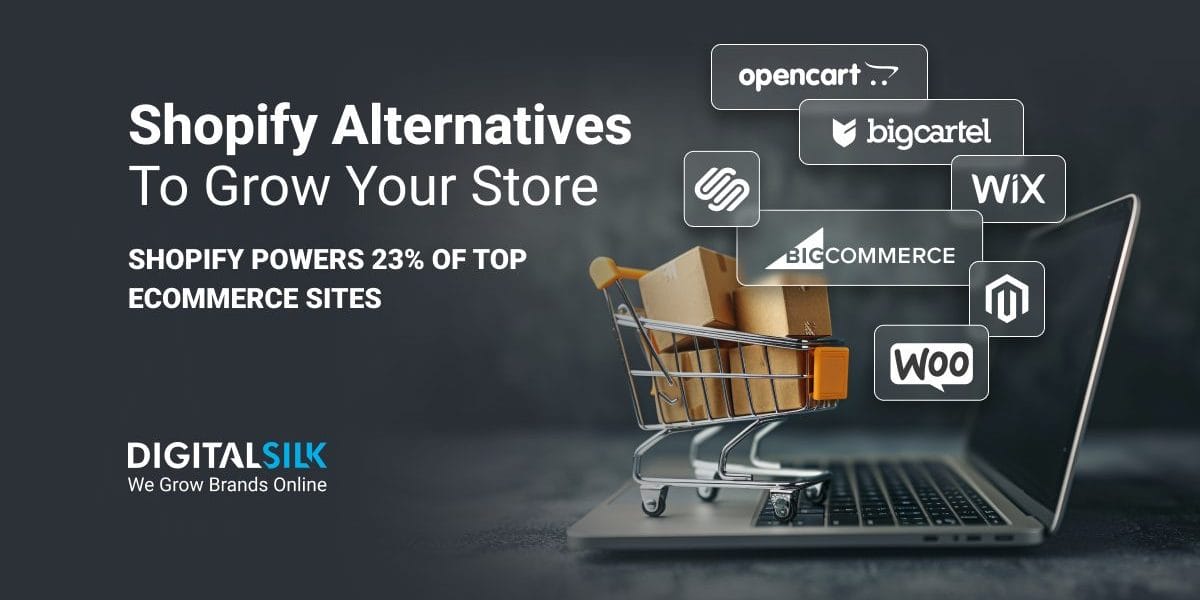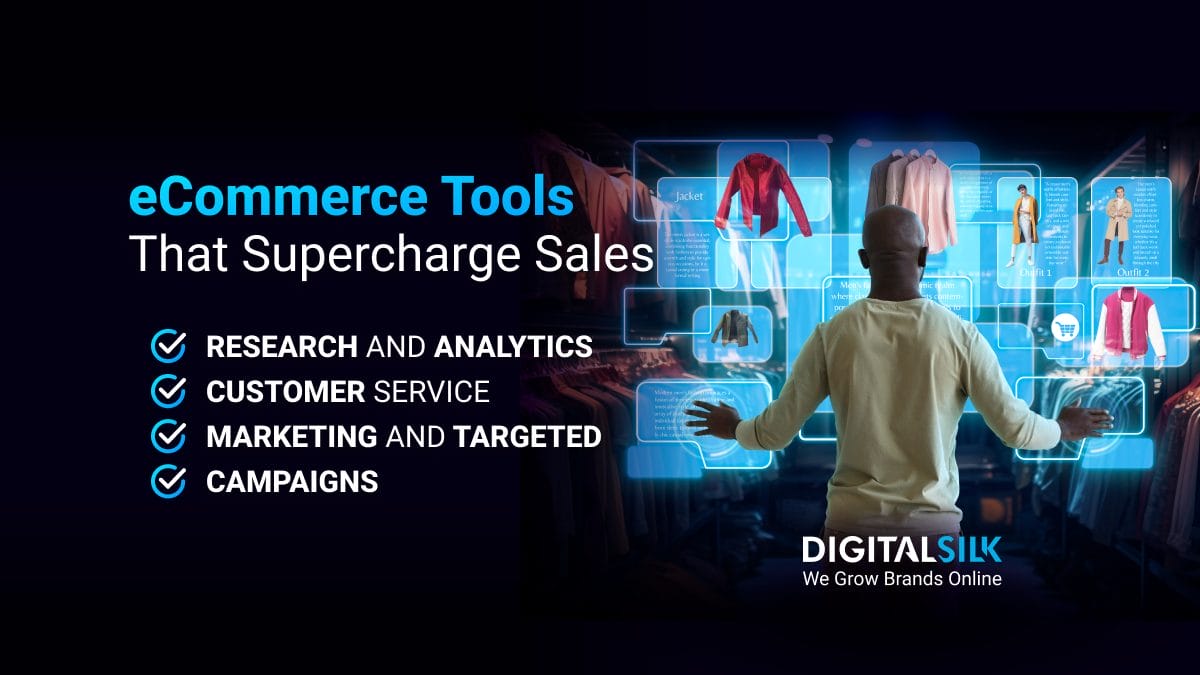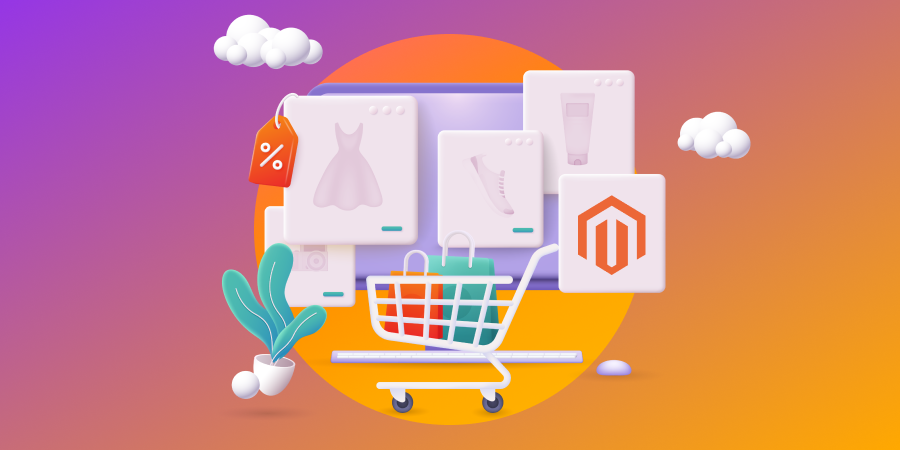Shopify powers 23% of the top one million eCommerce websites worldwide.
While the numbers are admirable, Shopify isn’t the only answer to eCommerce platform woes.
From features and functionalities to budget concerns, Shopify may not align with the requirements of your e-store.
So, what are the best Shopify alternatives?
Below, we’ll list the most popular eCommerce platforms in 2025, along with their price, features, pros and cons to help you make the best decision for your online store.
7 Best Shopify Alternatives & Competitors
Today, the market boasts a wide selection of eCommerce platforms catering to diverse business requirements, preferences and budgets.
Some of the best Shopify alternatives based on performance, features and ease of use to consider include:
1. WooCommerce
WooCommerce is a free WordPress plugin that transforms WordPress websites into fully functional eCommerce stores.
It provides extensive customization options and a diverse selection of extensions and themes.
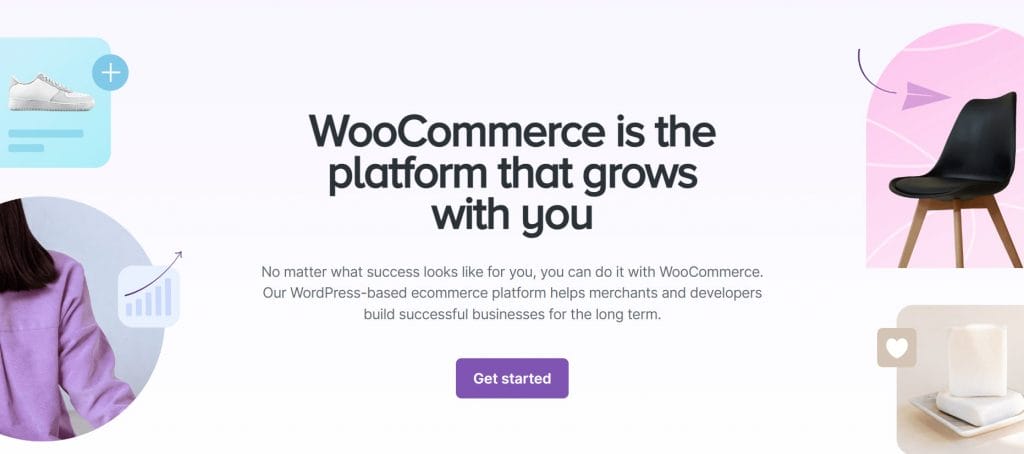
Price:
The basic WooCommerce plugin is free to use. However, you may need to pay for hosting, domain registration and premium extensions or themes.
Features:
WooCommerce offers customizable product pages, unlimited products and categories, flexible payment options, inventory management and extensive plugin support.
Pros:
- Free to use
- Highly customizable
- Seamless integration with WordPress
- Extensive plugin ecosystem
- Complete control over the website
Cons:
- Requires technical knowledge to set up and maintain
- Potential for higher costs with premium extensions and themes
- Scalability may depend on hosting capabilities
We build custom eCommerce stores. Request a Quote
2. BigCommerce
BigCommerce is an eCommerce platform that offers a wide range of features and customization options.
It’s a popular option with businesses of all sizes, providing built-in tools for selling across multiple channels.
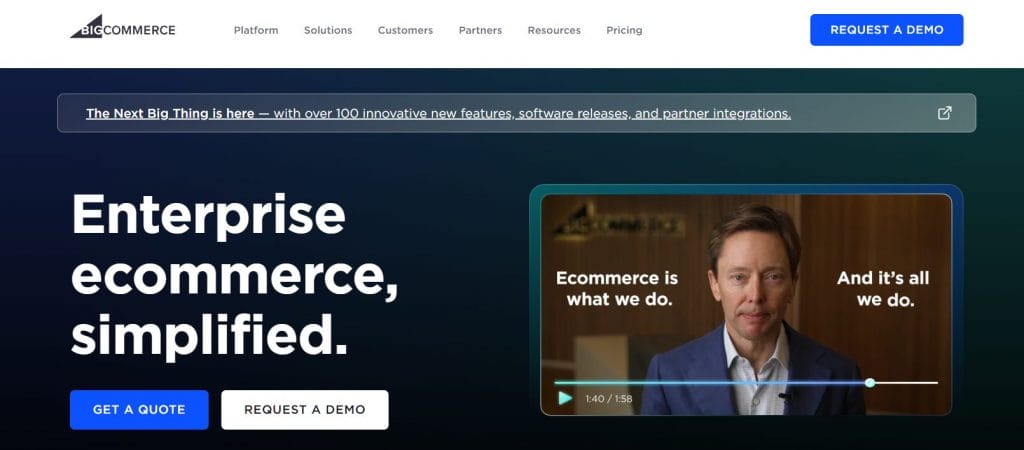
Price:
BigCommerce offers several pricing plans starting from $29 per month for the Standard plan, up to $299 per month for the Pro plan and a custom request Enterprise pricing plan.
Features:
BigCommerce features include unlimited products, bandwidth and staff accounts, responsive themes, multi-channel selling, abandoned cart recovery and advanced SEO tools.
Pros:
- A robust feature set
- Scalability
- Multi-channel selling capabilities
- Built-in SEO features
- Responsive themes
Cons:
- Higher pricing compared to other platforms
- Limited design flexibility compared to open-source solutions like WooCommerce or Magento
3. Adobe Commerce (Magento)
Adobe Commerce is a powerful eCommerce platform that caters to medium to large enterprises. It offers extensive features, flexibility and scalability for businesses with complex needs.
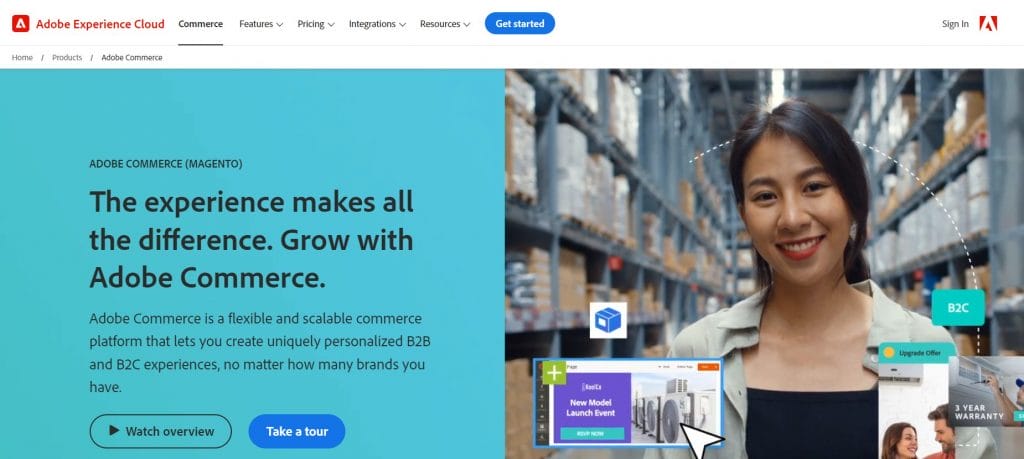
Price:
Magento offers both a free Community Edition and a paid Enterprise Edition, with pricing for the Enterprise Edition available upon request. Users may also incur costs for hosting, development and premium extensions.
Features:
Magento offers advanced product management, customer segmentation, multi-store support, extensive customization options and integration with third-party services.
Pros:
- Highly customizable and scalable
- A diverse set of features
- Multi-store and multi-language support
- Strong community and developer ecosystem
Cons:
- Requires technical expertise to set up and maintain
- Higher costs for development and hosting
4. Wix
Wix is a website builder with integrated eCommerce functionality. It offers drag-and-drop tools, customizable templates and various features for creating online stores.
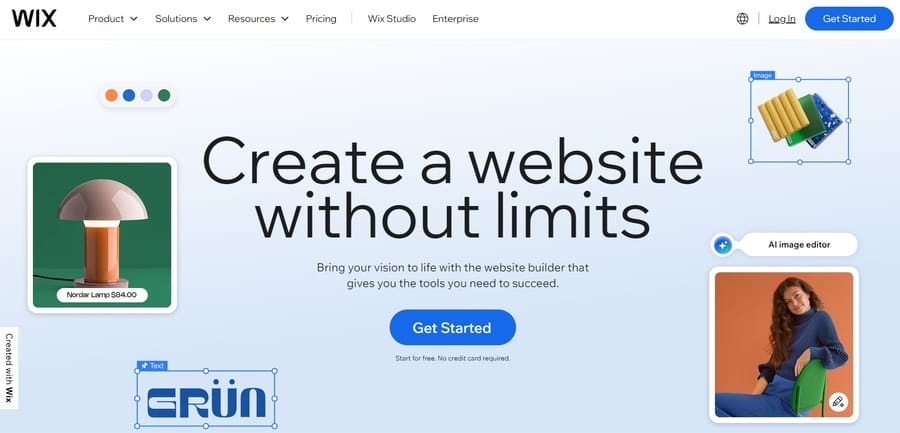
Price:
Wix offers several pricing plans for eCommerce, starting from $17 for the Light plan and $29 for the Core option, through $36 per month for the Business plan and up to $159 per month for the Business Elite plan. Wix also offers a customized Enterprise plan.
Features:
Wix features include customizable storefronts, product galleries, secure checkout, inventory management, marketing tools and integration with payment gateways.
Pros:
- Easy-to-use drag-and-drop interface
- Customizable templates
- Responsive customer support
Cons:
- Limited scalability compared to some other platforms
- Transaction fees on lower-tier plans
- Less flexibility for advanced customization
5. Squarespace
Squarespace is a platform for building websites that comes with integrated eCommerce features. It offers professionally designed templates, intuitive tools and integrated marketing features.

Price:
Squarespace has eCommerce plans starting from $16 per month for the Personal plan, up to $52 per month for the Commerce Advanced plan. High-volume businesses can also benefit from custom pricing.
Features:
Squarespace offers product variants, inventory management, secure checkout, email marketing and integration with payment processors.
Pros:
- Sleek design templates
- User-friendly interface
- Integrated marketing tools
- Reliable hosting and security
Cons:
- Limited customization compared to open-source platforms
- Transaction fees on lower-tier plans
- Fewer third-party integrations
6. OpenCart
OpenCart is an open-source eCommerce platform that offers easy and customizable solutions for building online stores.
It provides a range of features and extensions for managing products, orders and payments.
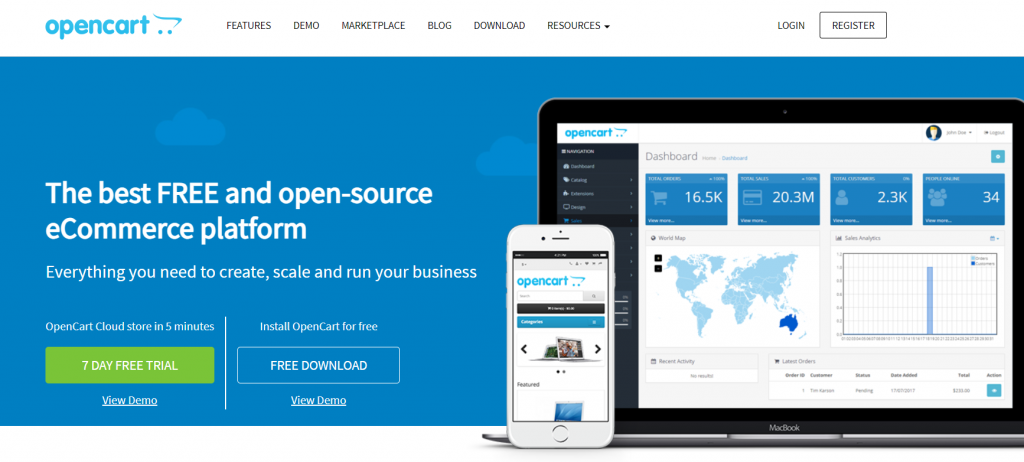
Price:
OpenCart is free to use, but your business will still face common expenses related to hosting, registering a domain and purchasing premium extensions or themes.
Features:
OpenCart offers customizable storefronts, unlimited products and categories, multiple payment gateways, shipping options and extension support.
Pros:
- Free and open-source
- Customizable
- Multi-store support
- Wide range of extensions and themes available
Cons:
- Requires technical knowledge to establish and maintain
- Limited support compared to hosted platforms
- Scalability may depend on hosting capabilities
7. Big Cartel
Big Cartel is an eCommerce platform designed specifically for artists and creators to showcase and sell their products online.
It offers a simple and intuitive selling experience, catering to individual artists, small businesses, and boutique brands seeking to showcase their unique and handmade items.
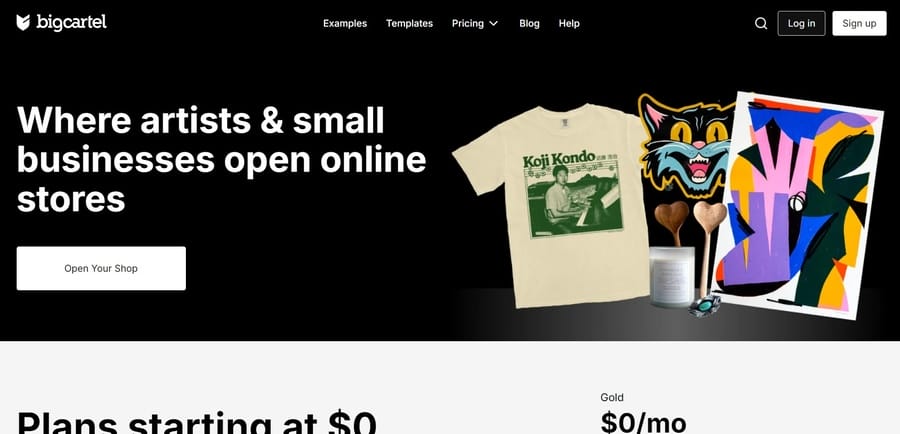
Price:
Big Cartel offers tiered pricing plans to accommodate different needs and budgets. It has a free plan, which is ideal for beginners or those with a limited number of products. It also offers a Platinum plan for $15 per month and a Diamond plan for $30 per month.
Features:
Big Cartel offers customizable storefronts, simple inventory management and mobile-friendly designs to ensure a seamless experience for both artists and customers.
Pros:
- Affordable pricing
- Easy to manage inventory
Cons:
- Limited scalability
- Limited integrations
Reasons To Consider Shopify Alternatives
Every business is different, and while Shopify works for many online stores, there are several reasons to consider alternatives for your brand:
- Cost: Shopify’s subscription fees and transaction costs might be a challenge for small businesses, especially those just starting.
- Customization: Some businesses may require deeper customization options than what Shopify offers, especially when they want to highlight their unique branding or complex product configurations.
- Scalability: While Shopify is scalable, some businesses may prefer other platforms that offer better scalability, more features and support for larger catalogs or higher traffic volumes.
- Ease of use: While Shopify has a user-friendly interface, some businesses may find alternatives that are easier to use, especially if they prioritize simplicity and quick setup.
- Integrations: Based on their specific needs, businesses may find that alternative platforms offer better integrations with third-party services or tools, such as CRM systems, email marketing platforms or fulfillment services.
What Is The Best Shopify Alternative For You?
Each of the above Shopify alternatives offers unique features and benefits, catering to different business needs, preferences and budgets.
Opt for WooCommerce instead of Shopify if:
- You already have a WordPress website.
- You want extensive customization options and access to a large plugin ecosystem to tailor your online store.
- You’re comfortable managing technical aspects like hosting and maintenance or have access to technical support.
- You’re on a budget and prefer a free platform with the option to add premium extensions as needed.
- You need integration with your existing content management system.
Choose BigCommerce over Shopify if:
- You’re a growing business that needs scalability and advanced eCommerce features.
- You want a platform with built-in multi-channel selling capabilities to reach customers across various channels.
- You prioritize robust SEO tools and abandoned cart recovery features to optimize your online store.
- You’re willing to invest in a platform with higher pricing for access to comprehensive features and support.
- You need a solution that caters to businesses of all sizes.
Choose Magento over Shopify if:
- You’re a medium-to-large enterprise with complex eCommerce requirements and high-volume sales.
- You need a highly customizable and scalable platform that can accommodate your business growth.
- You want access to advanced features like customer segmentation, multi-store support, and extensive customization options.
- You have the resources to invest in development, hosting and maintenance.
- You rely on a community and developer ecosystem for ongoing support and innovation.
Use Wix instead of Shopify if:
- You prioritize ease of use and want a user-friendly platform with drag-and-drop functionality.
- You need a visually appealing website with customizable templates and design options.
- You’re looking for an all-in-one solution that combines website building and eCommerce functionality.
- You’re a small business or individual looking to quickly set up an online store without technical expertise.
- You want integrated marketing tools to promote your products effectively.
Consider Squarespace before Shopify if:
- You’re a creative professional or small business owner looking for a visually stunning website.
- You prioritize sleek design templates.
- You need integrated marketing tools and analytics to grow your online business.
- You’re comfortable with a platform that offers limited customization compared to open-source solutions.
- You value reliable hosting and security features provided by a reputable website builder.
Explore OpenCart over Shopify if:
- You prefer a platform with a vast selection of extensions and themes to enhance your online store’s capabilities.
- You want full control over your online store’s design, functionality and customization options.
- You’re comfortable managing the technical aspects like hosting, security and updates.
- You’re on a budget and prefer a free, open-source solution.
Consider Big Cartel instead of Shopify if:
- You’re an artist, creator or small business owner selling unique and handmade products.
- You want a simple and intuitive platform.
- You’re on a tight budget and need an affordable solution.
- You value a platform that offers a personalized and artist-focused selling experience, without the complexities of larger eCommerce platforms.
We build custom eCommerce stores. Request a Quote
Choose Digital Silk For Your Next eCommerce Project
No matter which Shopify alternatives you choose, your e-store’s platform is only part of the equation.
Building, growing and maintaining a high-converting online presence takes dedication and expertise.
At Digital Silk, we’re more than just another agency for your eCommerce needs—we’re a strategic partner in growing your brand online.
What sets us apart is our platform-agnostic and proactive approach, with services including:
- eCommerce design and development
- Magento development
- Shopify development
- WooCommerce development
- Custom web design
- Custom web development
Our team of seasoned designers and developers collaborate seamlessly to bring your vision to life, ensuring that every pixel and line of code reflects your brand’s identity and values.
Contact us, call us at (800) 206-9413 or fill out the Request a Quote form below to schedule a free consultation and tell us about your eCommerce project’s requirements.
"*" indicates required fields


